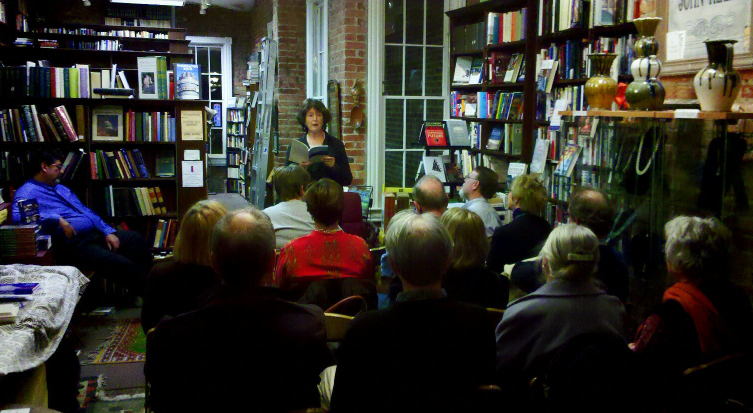WHAT SHE LOVED
i.m. Rachel Carson
The ocean’s long snow of seed
and sediment, shell and skeleton—
limy and silicious—
the flecks of husk and weed,
castoffs of mountain drivel,
river ooze. The sea’s purchase,
its constancy. The calm and unrelenting
diminution of matter:
the diatom’s unseen shells,
what the floods took and released,
skimmings of desert winds,
tooth of whale and the bone’s shearings,
the glacier’s blue bounty
lost in the hair of clouds,
all endlessly arriving.
Nothing refused
of these fragile chroniclers:
silt and melt and meteors,
the irresistible flakes
of the soft radiolarians,
the whispery mollusks
once plump with light.
These possessed her,
not the sea’s high billows, the crest,
the depths where color’s lost,
the trough that toys with ship and gull.
Not these, but what was worn
and unwanted—earth’s detritus,
the sea’s snow, flake by flake
falling through a watery patience
salvaging time’s story.
MY LIFE’S A SPECK ON A HORIZON
I CAN’T GET TO
My life didn’t want
lists and parties and houses.
It was greedy for a rhythm
like the drum of a pulsing heart,
or maybe a silence,
the one the stars poke through.
My life begged me to live it,
not to be sad and worn, but juicy
like a red-headed girl turned thirteen
whose silhouette bounces
on a drawn green shade.
What my life wanted danced that way,
not frightened and skittery,
not worried about pills and money.
So I don’t blame my life for going.
I want everyone to know that.
I would’ve gone too
if my mother hadn’t taught me
to finish my dusting first,
and if everyone’s hearts
didn’t forever need mending,
and if I weren’t scared
that when I got there
my life might be only an echo
I’d once heard.
IMMIGRANT DAUGHTER’S SONG
All gone--
the silver-green silk of time
winding down centuries
of custom and kinship,
the pouring of the sea,
the stars, bright pictures
on the slate of night,
the moon stamping forever
the spire of the church
on the sand,
bird-song, wind-song, mother-song.
Even time itself changed
to a ticking, a dot on a line.
Customs of grace
and gentleness gone
name-saying
and knowing
who begat whom
and when and where
and who could work
and who could sing
and who would pray
and who would not
and where the fish ran
and the wild plums hid
and how the old mothers
fit babies’ hands
to the five-flowered hollows
of blue ladyfingers,
and whose father fought whose
with golden swords
a thousand years ago
at Ballyferriter
on the strand below the church.
All gone--
changed from a silken spool unwinding
to rooms of relics and loss
behind whose locked doors
I dream
not daring to wake.
DEATH OF A FRIEND
Toward the end we talked fast
as though the brown shirts
were rushing at the door,
but I always went away thinking
I was forgetting to tell you
the most important thing.
We were never big on talking anyway.
Mostly we looked
at waves and morning skies
and wallpaper books
at light and mist and paintings.
And we walked. We walked
in the sun and the rain,
on beaches, in woods, over the twine fields.
And we breathed
with the water and the dunes and the trees
marching along, looking and looking.
And the only thing you ever did wrong
was bring sand into the bedrooms.
And the only thing I ever did wrong
was that once someone gave me a Waldorf cake
and I couldn’t remember what it looked like.
You’d sigh and wonder about the cake
while I’d sweep sand down the stairs.
And I made my poems
and you painted your waterlilies,
and all this went on for years,
which is why, at the end,
I could never remember
what was most important to say.
So I’d put ice on your arm
and you’d tell me I’m so blessed
and we’d doze, and finally,
in the mustard-green silence
of a July afternoon
they came and took you.
DEATH AND THE OCEAN
Walking at Head of the Meadow,
l try to wrap my mind
around the water
like Thoreau did,
and when I can’t--
I get that exact defeated feeling
I got with your death:
Death and the ocean give no quarter,
yet they’re beautiful.
Easy enough to see
in those seal-back swells
wheeling to marbled swirls,
but your dying, too, had beauty,
no matter the mess
and the pain and the smell.
Even though you were scared
and had no use for death--
slinking somewhere between the daylilies
and the picture of Jesus
the church lady pinned to your wall--
you still never said why me or
tried to bargain or got angry.
You stood straight up to death
the way a wave stands up,
transparent
and, really, loveliest then,
before it falls.
ACKNOWLEDGMENTS
Grateful acknowledgment is made to the editors and publishers of the following publications in which the above poems first appeared, some of them in a slightly different form:
Fathers and Children, and Ireland in Poetry, Harry N. Abrams; and The Irish, Hugh Lauter Levin Associates; and The Irish Americans, McDougal Littell, a Houghton Mifflin Company: “Immigrant Daughter’s Song”
New Letters and Voices of Cleveland, Cleveland State University Poetry Center: “Certain Things”
Poetry Greece: “Death of a Friend”
